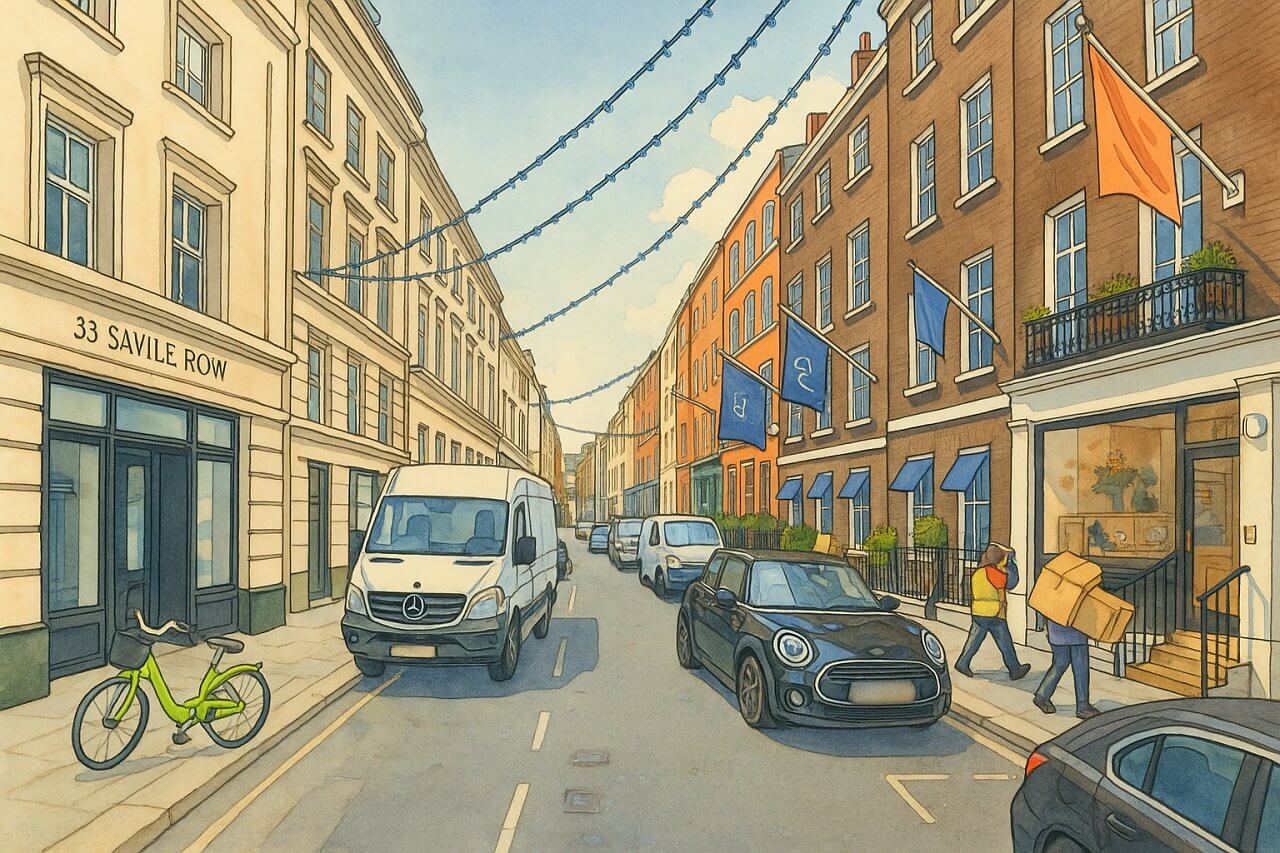
Savile Row, London
The world-famous street synonymous with bespoke tailoring and timeless British elegance.
Savile Row is located in the heart of Mayfair in the City of Westminster, Central London.
The street runs parallel to Regent Street, stretching from Conduit Street in the south to Boyle Street in the north, just behind the west side of Burlington Gardens and the Royal Academy of Arts.
This prestigious street is just a short walk from Oxford Circus and Piccadilly Circus, making it highly accessible for both locals and visitors.
Length of the Road
Despite its global reputation, Savile Row is only about 300 metres (980 feet) in length.
This relatively short distance is densely packed with world-renowned tailoring houses, upscale showrooms, and elegant façades that have defined British menswear for over two centuries.
History and Origins
Savile Row was built in the early 18th century, around the 1730s, as part of the Burlington Estate development led by the 3rd Earl of Burlington.
The area was intended for affluent residents and included a network of elegant streets and townhouses that catered to the upper classes of Georgian London.
Tailors began setting up shop here in the late 18th and early 19th centuries. By the early 1800s, the street had firmly established itself as the centre of bespoke tailoring in London and the world.
Name Origin and Pronunciation
The street was named Savile Row in honour of Lady Dorothy Savile, the wife of the 3rd Earl of Burlington. The name was applied in the 1730s as the estate was being developed.
Pronunciation: Savile is often mispronounced. The correct pronunciation is “Sav-ill”, not “Sah-vile.”
IPA notation: /ˈsævɪl/ 
Mispronunciations are common, especially among tourists, due to the unusual spelling versus phonetics.
The Character of the Street
Savile Row has a refined, elegant character that befits its status as a symbol of luxury British craftsmanship.
The architecture is understated yet classic, with Georgian and Victorian buildings housing tailors, offices, and private showrooms.
There’s a quiet exclusivity to the street—less foot traffic than surrounding shopping streets, but more presence, as clientele tend to visit by appointment for bespoke services.
Famous tailoring houses like Henry Poole & Co., Huntsman, Gieves & Hawkes, and Dege & Skinner continue to operate here, upholding traditions while subtly embracing modern trends.
Real Estate Prices on Savile Row (as of 2025)
Property prices on Savile Row reflect its prestige and central location. As of early 2025, commercial units on Savile Row can range from £3,000 to £5,000 per square foot (roughly £32,000 to £54,000 per sq metre), depending on condition, frontage, and tenancy potential.
Residential conversions are rare, but when available, they command upwards of £2.5 million for flats around 1,200 sq ft (111 sq m). Prices are consistently higher than even many prime West London locations due to the exclusivity and brand cachet of the area.
Nearest London Underground Stations
Savile Row is well-served by several London Underground stations:
- Oxford Circus Station – Bakerloo, Central, and Victoria lines. Approximately a 4-minute walk to the north.
- Piccadilly Circus Station – Bakerloo and Piccadilly lines. Roughly a 6-minute walk to the south.
- Green Park Station – Jubilee, Piccadilly, and Victoria lines. About 10 minutes on foot.
Its central location means the street is also accessible by several bus routes and is within walking distance of key landmarks like Regent Street, Bond Street, and the Royal Academy of Arts.
Fun Facts About Savile Row
1. The Beatles’ Last Performance: One of the most famous modern associations with Savile Row is the Beatles’ impromptu rooftop concert at 3 Savile Row on 30 January 1969, which was their final live performance together. The building was then the headquarters of Apple Corps.
2. James Bond's Tailor: Several tailoring houses on Savile Row, particularly Huntsman and Anderson & Sheppard, are known for inspiring or directly supplying costumes for James Bond films.
3. The Birthplace of Bespoke: The term “bespoke” is believed to have originated here, referring to cloth that was “spoken for” by customers—set aside for their personal garments.
Quick Facts
- Location: Mayfair, City of Westminster, Central London
- Length: Approx. 300 metres (980 feet)
- Built: 1730s as part of the Burlington Estate
- Named After: Lady Dorothy Savile
- Pronunciation: “Sav-ill” (/ˈsævɪl/)
- Famous For: Bespoke tailoring houses
- Property Prices (2025): £3,000–£5,000 per sq ft (£32k–£54k per sq m, commercial)
- Nearest Tube Stations: Oxford Circus, Piccadilly Circus, Green Park
- Fun Fact: Site of the Beatles’ last rooftop concert (1969)
Map of Savile Row, London

Painting of Savile Row, London (View image in full size)